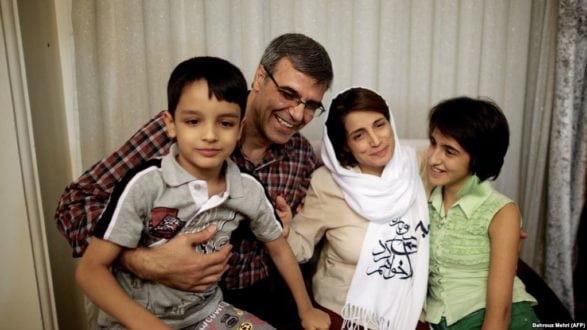CHRI – Khandan Denied Lawyer of His Choice
Detained civil rights activist Reza Khandan refused to appear at Branch 15 of the Revolutionary Court in Tehran on December 2, 2018, Mohammad Moghimi, who is trying to represent him, told the Center for Human Rights in Iran (CHRI) on December 5.
“Mr. Khandan believes that the charges brought against him are political in nature and therefore, based on Article 168 of the Constitution and the Political Crimes Law, his trial should be held in the open at the Tehran Criminal Court in front of a jury,” Moghimi said.
“Moreover, he is objecting to the court’s rejection of his chosen lawyer and not being given a chance to meet him to review his case,” he added. “These are the reasons why he refused to show up in court.”
According to Article 168 of Iran’s Constitution, “Political and press offenses will be tried openly and in the presence of a jury, in courts of justice. The manner of the selection of the jury, its powers, and the definition of political offenses, will be determined by law in accordance with the Islamic criteria.”
In January 2018, as part of an intensifying state crackdown on human rights defenders in Iran, judicial offices in several Iranian cities received state-approved lists of lawyers that have been allowed by the judicial branch to take on cases involving national security charges at the preliminary investigation stage.
CHRI has since documented several cases of experienced defense attorneys being barred from representing individuals held on political charges as well as the attorneys themselves being arrested.
“Judge [Abolqasem] Salavati has not accepted requests for my representation of Reza Khandan or [fellow activist and political prisoner] Farhad Meysami and I have not been allowed to study the cases against them. They remain without a lawyer,” he said.
Khandan has been in detention in Evin Prison since September 4, 2018, for posting news on social media and giving interviews about Sotoudeh.
Moghimi also told CHRI he did not know whether the court had issued a verdict in absentia in Khandan’s case, as it had in the case of his wife, prominent human rights attorney Nasrin Sotoudeh, who has been detained in Evin Prison since June 2018.
Moghimi said the charges against Khandan are “assembly and collusion against national security,” “propaganda against the state” and “encouraging prostitution by promoting non-observance of the hijab.”
Agents who searched his home the day they arrested him found badges opposed to Iran’s compulsory hijab law, which are now being used as evidence against him.
Moghimi told CHRI: “My client and I have not accepted any of these charges. They are completely objectionable and without legal merit. What assembly? What collusion? What propaganda against the state? All he did was inform the public about his imprisoned wife. And having badges against forced hijab in your home does not amount to promoting non-observance. I strongly object to these charges.”
In November 2018, UN human rights experts called on Iran to guarantee the rights of human rights defenders and lawyers who have been jailed for publicly supporting protests against the mandatory wearing of the hijab in Iran.
“We urge the Government to immediately release all those who have been imprisoned for promoting and protecting the rights of women,” the experts said.
In particular, the experts expressed alarm at the critical health of Meysami, a medical doctor, who was arrested in July after his advocacy in support of women protesting against the hijab law.
Sotoudeh has been on hunger strike since November 26 to demand that Meysami receive proper medical care outside the prison.
 Shabtabnews In this dark night, I have lost my way – Arise from a corner, oh you the star of guidance.
Shabtabnews In this dark night, I have lost my way – Arise from a corner, oh you the star of guidance.



